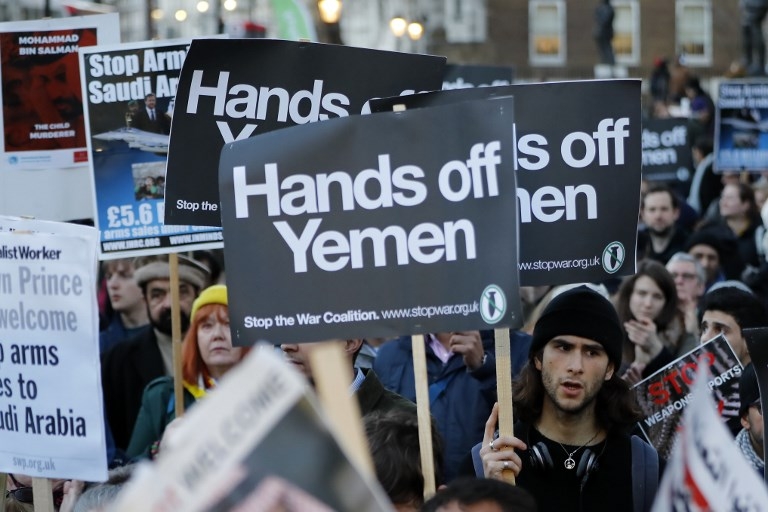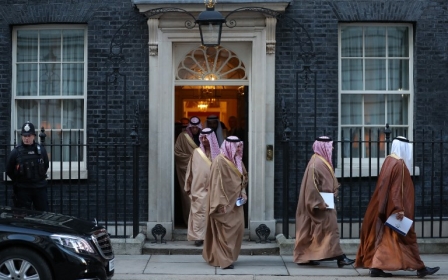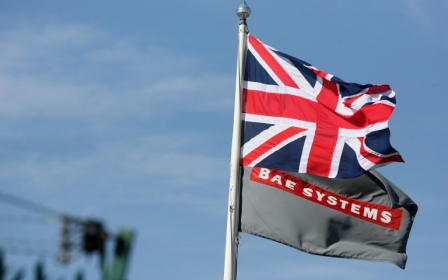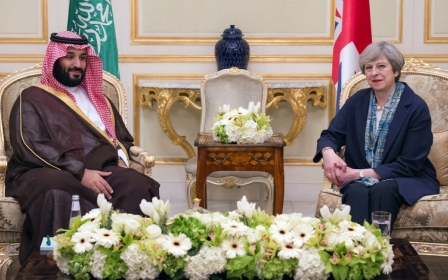Rights groups join landmark appeal to block UK sales to Saudi Arabia

Pressure is mounting on the UK government over its arms exports to Saudi Arabia after three rights groups have been granted permission to join a landmark legal appeal over the sales.
Human Rights Watch, Amnesty International and Rights Watch UK will now intervene in a judicial review of the government's arms trade policy towards the kingdom first brought by the Campaign Against Arms Trade (CAAT) last year.
"If the murder in the embassy...the worst humanitarian crisis... and the death of tens of thousands of people is not enough, then what would it take for Jeremy Hunt and his American counterparts to finally end the arms sales?'
- Andrew Smith, Campaign Against Arms Trade
Behind the US, the UK is one of the biggest arms exporters to Saudi Arabia with sales of more than $6bn since the Saudi-led coalition began bombing Yemen in March 2015. The coalition has conducted thousands of air strikes that often target civilian areas.
The UK has some of the most stringent arms export laws in the world, but the question underlying the judicial review is whether they are enforced.
CAAT lost its initial challenge at the High Court in July 2017, but an appeal is scheduled for April next year. Now the three rights organisations will be allowed to submit evidence in the appeal.
"Certainly the fact that their intervention has been allowed by the court is something that is going to be really welcome and will hugely strengthen our case," CAAT spokesman Andrew Smith told Middle East Eye on Monday.
The UK government's policy towards Saudi Arabia has come under greater scrutiny in the wake of Saudi journalist Jamal Khashoggi's murder in the Saudi consulate in Istanbul last month.
Politicians on both sides of the Atlantic have called for the end of arms sales to the kingdom in recent weeks, but neither government has suspended their sales.
In the strongest statement yet from the US on the Yemen war, Secretary of State Mike Pompeo last week urged all parties in the conflict to end their fighting
A day later, UK Foreign Secretary Jeremy Hunt suggested that the UK - which is the "penholder" with responsibility for Yemen on the UN Security Council - would push for a UN resolution for a ceasefire in the country if UN envoy to Yemen Martin Griffiths is able to establish a cessation of hostilities in the country.
Last week, the Armed Conflict Location & Event Data Project, an independent research group, reported that at least 56,000 people have been killed in armed violence in Yemen since January 2016.
The tally is more than five times higher than the 10,000 figure which has been regularly cited for the past two years.
Clive Baldwin, senior legal adviser at Human Rights Watch, told MEE on Monday that in the time that has passed since CAAT's initial challenge, there is "no sign" that the Saudi-led coalition has changed its conduct towards civilians in the war.
"Also the British government have continuously relied on letting the Saudis investigate the cases [of air strikes hitting civilians] themselves," he said, a process that is "not fit for purpose".
Asked whether he believed CAAT's appeal would be successful, Smith said: "If the murder in the embassy is not enough, and if the worst humanitarian crisis is not enough, and if the death of tens of thousands of people is not enough - then what would it take for Jeremy Hunt and his American counterparts to finally end the arms sales?"
Middle East Eye propose une couverture et une analyse indépendantes et incomparables du Moyen-Orient, de l’Afrique du Nord et d’autres régions du monde. Pour en savoir plus sur la reprise de ce contenu et les frais qui s’appliquent, veuillez remplir ce formulaire [en anglais]. Pour en savoir plus sur MEE, cliquez ici [en anglais].




